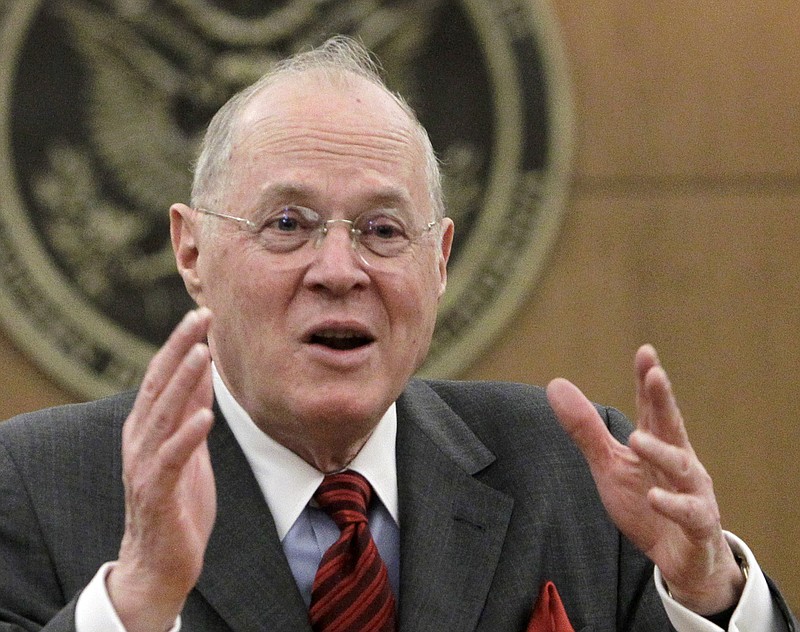Name the last United States Supreme Court justice appointed by a Democratic president who failed to vote in practical lockstep with the president who appointed him or her.
We'll wait ...
Right, one doesn't readily come to mind.
But Republican-appointed justices who have disappointed the presidents who appointed them? In just over 60 years, there are more than can be counted on one hand.
Roberts, Kennedy, Souter, O'Connor, Stevens, Powell, Blackmun, Brennan and Warren immediately come to mind. Others may think more names deserve to be added to that list.
Scholars debate why this is so. Some have posited reasons such as the influence of the liberal Washington, D.C., social circuit, the fear of being branded by the liberal national media, the fear of being on the wrong side of history or the justices simply becoming more tolerant of social issues as they age.
Other experts point to the justices' opportunities for more foreign travel - and the exposure to foreign ideas - and to the justices' exposure to wider and more divergent working relationships.
A now 80-year-old database called the Martin-Quinn score even quantifies the drift of justices. It reveals justices nominated by Republicans in general become more liberal as they age, while justices nominated by Democrats in general become even more liberal but more gradually than Republicans.
Even with all of the above being known, minority Democrats in the U.S. Senate still want to exercise control over President Trump's pick for the high court. They want to ensure no justice will be nominated who would consider overruling the 1973 Roe v. Wade law that somehow found in the Constitution wording that would allow women to abort the babies they are carrying in their womb.
That justices are confirmed with the advice and consent of the Senate is not an issue here. The Senate, for many reasons, has found various appointments unwarranted. Poor John Tyler, who served for less than one presidential term in the 1840s, tried but failed multiple times to get three different justices confirmed, he tried and failed to get one other justice confirmed, and he found success with only one appointment.
Generally, though, until 1987, Democrats got the justices they nominated and Republicans got the ones they wanted. Then came President Ronald Reagan's nomination of Robert Bork, a brilliant jurist but one expected to be a reliably conservative vote. He would be replacing Lewis Powell, a Republican appointee who turned out to be a swing voter between liberal and conservative opinions, as did the retiring Anthony Kennedy.
Democrats, afraid then as they are today of a justice who would vote to overturn Roe v. Wade, held a 54-46 advantage in the Senate. They weren't about to allow a reliable conservative on the court and didn't. Bork was rejected, and Kennedy eventually took his spot. That began the politicization of Republican court nominees that has existed until today.
Now, with Trump hated by the left because he upset shoo-in Democratic candidate Hillary Clinton in 2016, Democrats say they'll pull out all the stops to prevent a Trump nominee they suspect might waver on Roe v. Wade - trust us, that'll be any nominee - from being confirmed.
But why shouldn't the duly elected president be afforded the pleasure of his choice?
Of voters who told CNN in a 2016 exit poll that the Supreme Court was the "most important factor" in their selection for president, 56 percent voted for Trump. In an NBC News exit poll, 75 percent of Trump voters said it was the "most important factor" or "an important factor" in their vote.
So why shouldn't voters get what they thought they were voting for?
The president said last week he would announce his choice Monday, and a confirmation process would be expected to be in late summer.
Despite the opposition to probably any nominee by Democratic leaders, Trump has a few of them over a barrel. Democratic senators in Florida, Indiana, Missouri, North Dakota and West Virginia all are in states won in 2016 by Trump. Opposition to the Supreme Court pick - and there will be lots of pressure on them - could sink their candidacy. A vote for the pick may win them some votes.
Several Republican senators have made noises about opposing any selection who would not declare abortion a settled issue. Yet, most high court nominees are smart enough to declare they won't comment on a hypothetical set of circumstances.
We believe the president, who has a majority Republican Senate and rising nationwide approval numbers in some polls, will get his nominee. We're hopeful it won't be an addition to the list of justices who drift leftward over time. Nearly 63 million Trump voters, who left no doubt why they voted for the man, no doubt agree.
